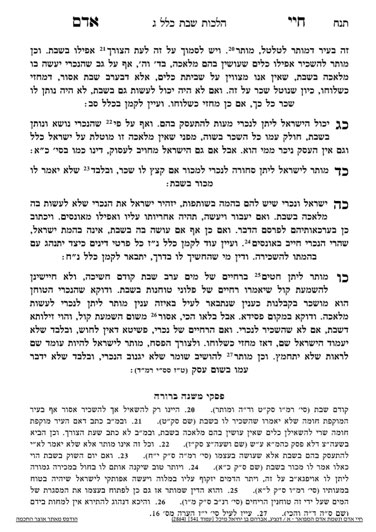We have finished siman 26, and have been discussing the use of machinery on Shabbos. We left off discussing a case of a millstone and the placement of grain into the hopper (the feeder to the millstone) on Shabbos. Today, we will discuss the issur for a Jew to place grain into the hopper, as it will affect the issur of instructing a non-Jew.
The simple understanding is that it is an issur deoraysa for a Jew to put grain into the hopper on Shabbos. Even though the placement of the grain into the hopper does not directly cause it to be milled, but rather it happens on its own due to the movements of the machine, it is still considered the actions of the person who places the grain into the hopper. The Chayei Adam appears to hold that it is assur deoraysa, such that if one were to instruct a non-Jew, it would be amira l’achum on a deoraysa, for which we have no place to be lenient.
However, the Magen Avraham, in 252:20, suggests that the case in the Gemara, which is the source for this issur, is actually a gezeira l’gezeira (i.e., a derabanan), and not a chiyuv deoraysa as was the understanding of the Chayei Adam. Although the Rambam and Semag seem to support his understanding, he points out that Tosfos would disagree. Tosfos would hold that just placing the grain into the feeder would make a person chayav on a deoraysa level. If so, we could theoretically be lenient in certain situations, such as cases of significant loss when done by a non-Jew, and would not require that the criteria we have discussed until now which disassociate the Jew from the actions of the non-Jew (kablan, fixed wage, etc.).
On the other hand, the Magen Avraham (?) points out that if we argue that something which happens on its own is not a chiyuv deoraysa, putting dough in a heated oven on Shabbos should not be an issur deoraysa, because we could argue that its not the action of placing the dough in the oven which caused the bread to bake, but rather the heat of the oven, and the person’s action is not connected. Similarly, Tosfos discusses how a person who sets a trap on Shabbos is chayav deoraysa, even though according to this argument, the trap has trapped on its own and is not connected to the person who set it. Thus, we see that there is an argument that placing grain into the hopper is not derabanan and indirect, but rather an assur deoraysa. If so, there should be no leniencies regarding amira l’achum. The Magen Avraham concludes that it is a machlokes.
The Even Haozer, in siman 328, discusses putting a leech on a person’s body on Shabbos as a medical procedure. Drawing blood from a person on Shabbos is an issur deorasya known as chavalah. Placing the leech is deoraysa as well, even though the leech sucks blood itself and is not a direct action from the person who placed it. Again, we see that taking control of the various abilities of machines or animals is a melacha deoraysa, even though a person does not do the melacha themselves.
The Ramban, in the last perek of Maseches Shabbos, writes that although mechamer (directing an animal) is only an issur lav and not an issur sekilah, if a person actively directs an animal in plowing, they are chayav sekilah as though they were plowing themselves, because it is an issur deorasya.
Thus, the assumption of many poskim is not in accordance with the possibility in the Magen Avraham that melacha which happens indirectly in derabanan. Rather, they hold that taking control of various abilities of machines or animals is as though they have done the melacha themselves and is an issur deoraysa. Additionally, if one does allow their machine to run, they would be chayav for any melacha it creates, and not just the moment of turning it on. Therefore, in order for amira l’achum to be permitted in our situation, the arrangement must be of a kablan, who has a fixed wage, and who is working on his own time, in addition to the other elements we have discussed. Essentially, the work cannot be connected back to the Jew.
This is a complicated discussion but one which is important. If one has a practical question, they should ask their rav.
Summary
It is muttar to set melacha in motion before Shabbos which will operate over Shabbos with two conditions.
- One must be concerned for maris ayin, but there is no issue of maris ayin if it is something which is standard to derive benefit from on Shabbos due to having set it in motion before Shabbos.
- One must also be concerned about zilusa d’Shabbos, but can be meikil in a case of financial loss. Additionally, if there is no maris ayin, one can be meikil on zilusa d’Shabbos outside of the techum.



